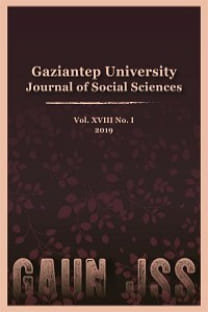KORONAVİRÜS PANDEMİSİNİN HAVAYOLU ŞİRKETLERİNİN HİSSE SENETLERİ ÜZERİNE ETKİSİ: KANTİL-KANTİL REGRESYON MODELİ UYGULAMASI
2019 yılının Aralık ayında Çin’in Wuhan şehrinde ortaya çıkan ve kısa sürede tüm dünyayı etkisi altına alan Koronavirüs (Kovid-19) salgını birçok sektörü olumsuz etkilemiştir. Bu süreçte, ülkeler virüsün yayılmasını engellemek için çeşitli seyahat kısıtlamaları getirerek bu süreci kontrol altında tutmak istemişlerdir. Salgının en erken ekonomik etkileri havacılık sektöründe hissedilmeye başlanmıştır. Bu durum, havayolu şirketlerinin finansal kayıplarını artırmıştır. Bu çalışmada, dünya genelinde raporlanan günlük Kovid-19 vaka sayılarının küresel havayolları şirketlerine ait hisse senetleri üzerindeki etkisi Kantil-Kantil regresyon yöntemi yardımıyla incelenmiştir. Elde edilen bulgulara göre, genel olarak hisse senedi fiyatlarının ele alınan dönemdeki en düşük değerlerinin vaka sayılarından daha güçlü negatif etkilenmiştir. Bir diğer ilginç bulgu ise, Asya merkezli havayolu şirketlerine ait hisse senedi fiyatları diğer havayolu şirketlerine gore daha az negatif etkilenmiştir.
Anahtar Kelimeler:
Kovid-19, Havayolu Şirketleri, Kantil-Kantil Regresyon Modeli
THE IMPACT OF CORONAVIRUS PANDEMIC ON AIRLINE STOCKS: AN APPLICATION OF QUANTILE-ON-QUANTILE REGRESSION MODEL
Coronavirus disease that appeared in Wuhan City, China in December, 2019 that has negatively affected many industries around the world over the short term. Countries has imposed various travel restrictions to prevent the spread of the virus during this process. The earliest economic effects of the epidemic were felt in the airline industry, which increase the financial losses of the airline companies. This study makes an attempt to examine the impact of daily confirmed cases of Covid-19 around the world on the international airline companies’ stock market prices by using Quantile-on-Quantile regression approach. The findings reveal that, in general, the number of cases has a strong negative impact on the lowest values of airline stocks in the period studied. Interestingly, the airline companies operating in Asia were less adversely affected compared to other airlines
___
- Arif, I., & Khan, L. (2019). Relationship between oil price and white precious metals return: new evidence from Quantile-on-Qauntile regression. Pakistan Journal of Commerce and Social Sciences, 13(2), 515-528.
- Bouoiyour, J., Selmi, R., Shahzad, S.J.H., & Shahbaz, M. (2017) Response of stock returns to oil price shocks: Evidence from oil importing and exporting countries, J. Econ. Integr. 32(4) 954–977.
- Chang, B.H., Sharif, A., Aman, A., Suki, N.M., Salman, A., & Khan, S.A.R. (2020). The asymmetric effects of oil price on sectoral Islamic stocks: newevidence fromquantile-on-quantile regression approach. Resources Policy, 65, 101571.
- Lin, B., & Su, T. (2020). The linkages between oil market uncertainty and Islamic stock markets: Evidence from quantile-on-quantile approach. Energy Economics, 88, 104759. Loh, E. (2006). The impact of SARS on the performance and risk profile of airline stocks. International Journal of Transport Economics, 33(3), 401-422.
- Mallick, H., Padhan, H., & Mahalik, M.K. (2019). Does skewed pattern of income distribution matter for the environmental quality? Evidence from selected BRICS economies with an application of Quantile-on-Qauntile regression (QQR) approach. Energy Pol., 129, 120–131.
- Mishra, S., Sharif, A., Khuntia, S., Meo, S. A., & Khan, S. A. R. (2019). Does oil price impede Islamic stock indices? Fresh insights from wavelet-based quantile-on-quantile approach. Resources Policy, 62, 292–304.
- Rawat, A. S., & Arif, I. (2018). Does geopolitical risk drive equity price returns of BRIC economies? Evidence from quantile on quantile estimations. Journal of Finance and Economics Research, 3(2), 24–36.
- Raza, S. A., Zaighum, I., & Shah, N. (2018). Economic policy uncertainty, equity premium and dependence between their quantiles: Evidence from quantile-onquantile approach. Physica A: Statistical Mechanics and its Applications, 429, 2079–2091.
- Shahzad, S.J.H., Shahbaz, M., Ferrer, R., & Kumar, R.R. (2017). Tourism-led growth hypothesis in the top ten tourist destinations:New evidence using the quantile-on-quantile approach. Tourism Management, 60, 223-232.
- Shahbaz, M., Zakaria, M., Shahzad, S.J.H., & Mahalik, M.K. (2018). The energy consumption and economic growth nexus in top ten energy-consuming countries: fresh evidence from using the quantile-on-quantile approach. Energy Econ., 71, 282–301.
- Shahzad, F., Shahzad, U., Fareed, Z., Iqbal, N., Hashmi, S.H., & Ahmad, F. (2020) Asymmetric nexus between temperature and COVID-19 in the top ten affected provinces of China: a current application of quantile-on-quantile approach. Sci Total Environ, 139115.
- Sharif, A., Afshan, S., & Qureshi, M. A. (2019). Idolization and ramification between globalization and ecological footprints: evidence from quantile-on-quantile approach. Environmental Science and Pollution Research, 1-21.
- Sim, N., & Zhou, H. (2015). Oil prices, US stock return, and the dependence between their quantiles. J. Bank. Financ. 55, 1–8.
- ISSN: 1303-0094
- Yayın Aralığı: Yılda 4 Sayı
- Başlangıç: 1991
- Yayıncı: Gaziantep Üniv. Sosyal Bilimler Enst.
Sayıdaki Diğer Makaleler
İlkut Elif KANDİL GÖKER, Binali Selman EREN, Süleyman Serdar KARACA
Covid-19 Süresince İnsanların Yeme Davranışındaki Değişim
Covid-19’un En Etkili Olduğu Ülkelerde Salgın-Borsa İlişkisi
Nuri HACIEVLİYAGİL, Arif GÜMÜŞ
Serhat YUKSEL, Hasan DİNÇER, Hakan KALKAVAN, Hüsne KARAKUŞ, Gözde Gülseven UBAY
Korona Virüs Salgını ile Döviz Kuru Arasındaki İlişkinin Ampirik Analizi: Türkiye Örneği
Ayşe ERGİN ÜNAL, Halil İbrahim AYDIN, Mehmet Vahit EREN
Üretim ve Hizmet Sektörlerinin Covid-19 Süreci ve Sonrasındaki Geleceği Üzerine Bir Değerlendirme
Gülşen YURDAKUL, Abdullah ÇELENK, Mustafa DEVECİ, Tülin DURUKAN
Koronavirüs Pandemisiyle İlgili Kitle Fonlaması Projelerine İlişkin Betimleyici Bir Çalışma
